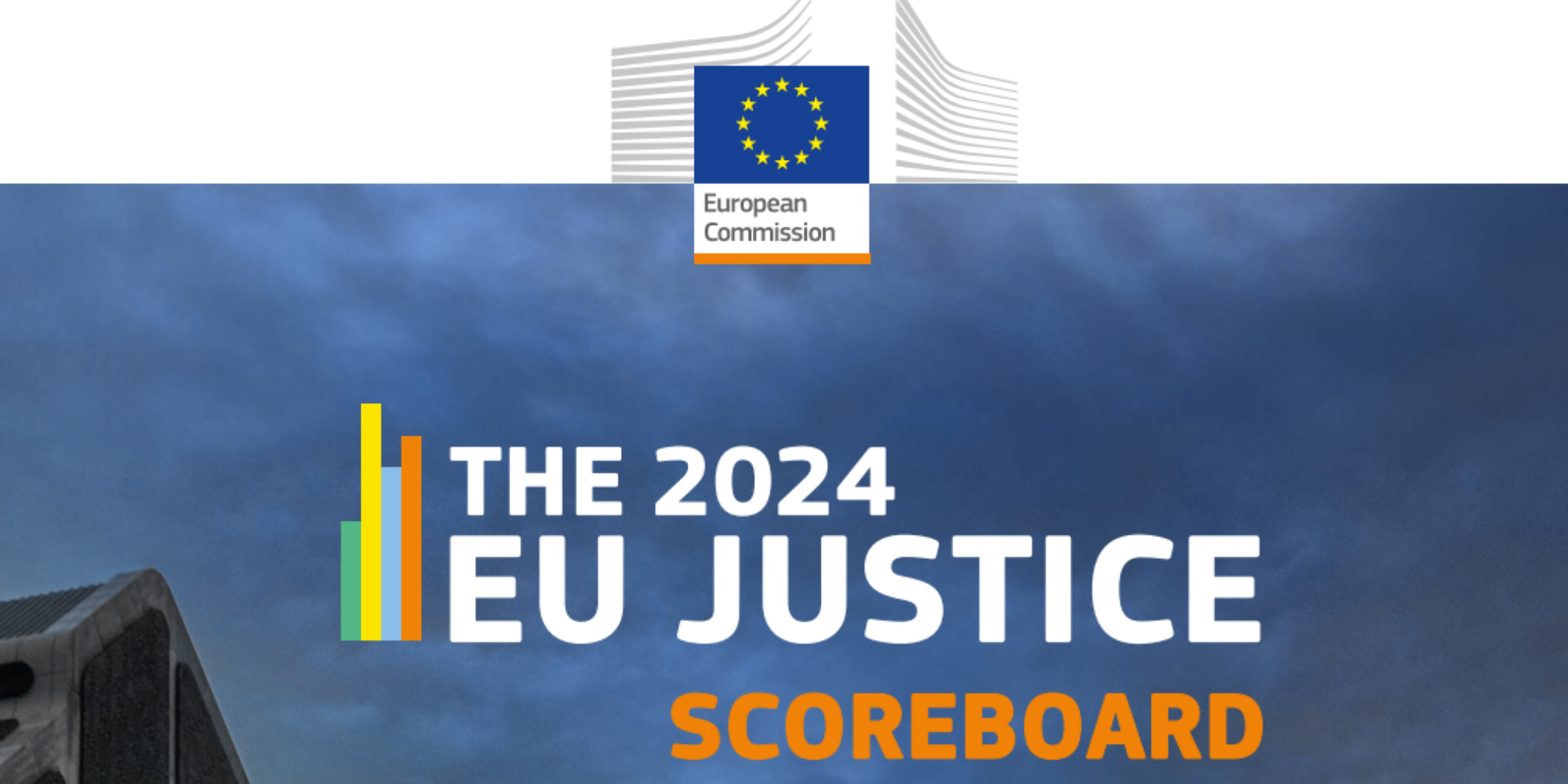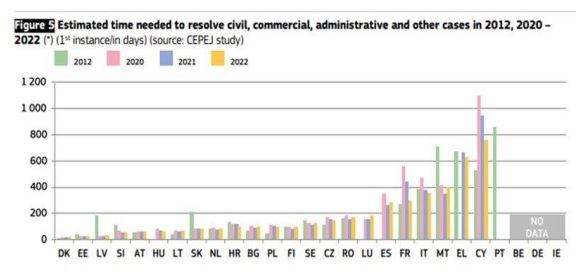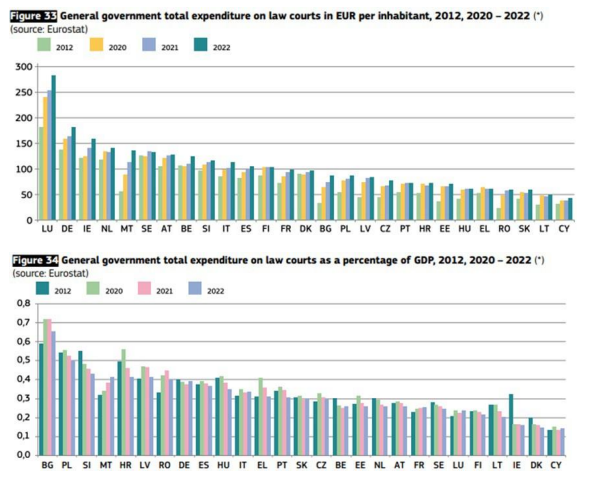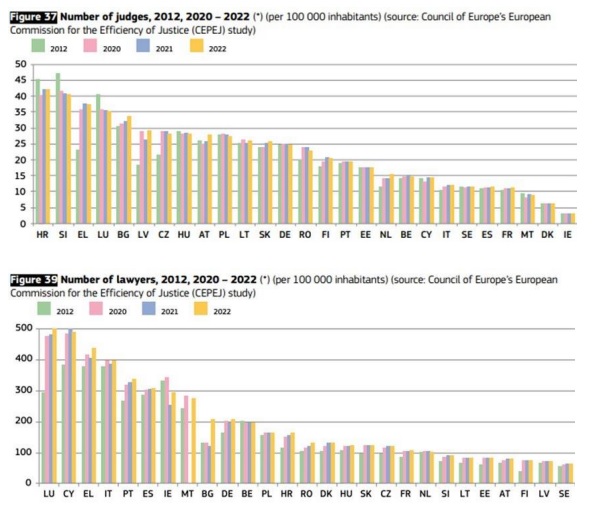EU Justice Scoreboard 2024: Cypriot Justice Remains at the Bottom of Europe

Introduction
The European Commission has released the twelfth edition of the EU Justice Scoreboard, an annual report that provides indicators and trends on the performance of national justice systems over time. Each year, the Justice Scoreboard offers a comprehensive summary of data on three fundamental components of effective national justice systems: efficiency, quality, and independence.
This year's Scoreboard features several new figures on the accessibility of justice. The 2024 edition also introduces, for the first time, specific new figures on judicial independence, such as the appointment processes for court presidents, national frameworks for asset declarations, and the dismissal procedures for Prosecutors General.
As highlighted, a large number of Member States have continued their efforts to further improve the effectiveness of their justice systems. Figure 1 indicates that Cyprus has engaged in legislative and regulatory activities concerning its justice system in 2023. Specifically, Cyprus has adopted measures in various categories, including procedural law, the council for the judiciary, redesigning the judicial map, court specialisation, ICT in the justice system, and judicial matters. Additionally, certain initiatives such as ADR methods, the administration of courts, and legal aid are currently under negotiation. Despite these efforts, Cyprus remains at the lower end of the spectrum compared to other EU member states in terms of the number and scope of adopted and planned measures. Figure 1 is foreshadowing Cyprus’ performance which as provided by the 2024 EU Justice Scoreboard, it is the worst in the EU.
Efficiency of Justice Systems
The EU Justice Scoreboard monitors this efficiency using three main indicators: the length of proceedings, the clearance rate, and the number of pending cases.

Regarding the length of proceedings as indicated by figure 5, Cyprus has seen a decrease in the estimated time needed to resolve civil, commercial, administrative, and other cases in 2022 compared to the previous two years. However, Cyprus still has the longest duration in Europe for court case resolution, averaging 800 days at the first instance. Additionally, Cyprus has not provided data for the estimated resolution time for litigious civil and commercial cases at the first instance for 2012 and 2020-2022. In 2022, Cyprus also took the longest time at the second instance courts taking approximately 1700 days.
Regarding the clearance rate, Cyprus achieved values above 100% for resolving civil, commercial, administrative, and other cases in 2022, indicating a higher number of cases resolved than received. This represents a notable improvement from 2020 and 2021, when the values were below 100%.
Concerning pending cases, the number of unresolved cases at the end of 2022 slightly decreased compared to 2021, though the situation in 2020 appeared better. This improvement appears to be marginal, especially since the situation appeared better in 2020, and Cyprus remains near the bottom in terms of pending cases.
ΔΕΙΤΕ ΕΔΩ ΟΛΑ ΤΑ ΣΕΜΙΝΑΡΙΑ ΓΙΑ ΔΙΚΗΓΟΡΟΥΣ ΚΑΙ ΝΟΜΙΚΑ ΘΕΜΑΤΑ
We Do Not Invest in Justice
Persistent data collection challenges over a decade imply a broader issue: a lack of investment by national authorities in improving their capacity to produce accurate judicial statistics. Sufficient resources, including the necessary investments in physical and technical infrastructure, and well qualified, trained and adequately paid staff of all kinds, are necessary for the justice system to work properly. Without adequate facilities or tools, the quality of proceedings and decisions is undermined. The general government total expenditure on law courts in EUR per inhabitant and as a proportion of gross domestic product (GDP), as figures 33 and 34 indicate, is the worst in Europe.

Quality of Justice Systems
The use of digital technology by Cyprus courts in 2023 is among the lowest in Europe. While Cyprus employs distance communication technology, particularly for videoconferencing, almost exclusively in criminal cases still, an electronic case management system, electronic case allocation with automatic distribution based on objective criteria, and secure remote work for judges, its overall use of digital tools is not as comprehensive as in many other Member States. This partial implementation indicates that while Cyprus is progressing towards digitalisation, there are still significant gaps that need to be addressed to achieve a fully integrated and efficient electronic communication system within its judiciary.
Leveraging technology could enhance efficiency, especially given the shortage of judges in the country. According to Figure 37, Cyprus is one of the countries with the lowest number of judges, while it has the second highest number of lawyers after Luxembourg for the years 2020-2022 as figure 39 shows. This shortage of judges means each judge has a heavier caseload, which slows down the judicial process and leads to a growing backlog of cases. Although having many lawyers ensures ample legal representation, it does not guarantee effectiveness if the system itself cannot process cases efficiently. The imbalance between the high number of lawyers and the low number of judges highlights the need for better resource allocation and investment in judicial infrastructure, including the adoption of digital tools.

Promoting alternative dispute resolution (ADR) methods can significantly help alleviate this backlog. The 2024 EU Justice Scoreboard continues to analyse the ways in which Member States promote voluntary use of alternative dispute resolution methods (ADR), including the possibility of using digital technologies. Cyprus has a relatively lower aggregate score in promoting and incentivising ADR methods across all categories compared to other EU member states. Although Cyprus has some measures in place for promoting ADR in 2023, these measures are not as extensive as in higher-scoring countries, especially in civil and commercial disputes, where Cyprus has the lowest score.
ΔΕΙΤΕ ΕΔΩ ΟΛΑ ΤΑ ΣΕΜΙΝΑΡΙΑ ΓΙΑ ΔΙΚΗΓΟΡΟΥΣ ΚΑΙ ΝΟΜΙΚΑ ΘΕΜΑΤΑ
Independence
Compared to other EU member states, Cyprus shows relatively high levels of concern from the public as well as from companies operating in Cyprus regarding political but especially economic interference in the judiciary. This indicates a substantial perception that external pressures other than the merits of the case are undermining judicial independence in Cyprus, contributing to the low public confidence in the system and undermines the overall investment climate.
Conclusion
In summary, while Cyprus has initiated some reforms and measures to improve its justice system, these efforts have not been matched by a corresponding shift in culture, mindset, and philosophy among all legal representatives, who must embrace and uphold this newly introduced approach. Additionally, there is a significant need for accelerated and comprehensive efforts to enhance efficiency, quality, and independence within the judiciary. Addressing these challenges will require a commitment to transparency, improved data reporting, increased investment in judicial infrastructure, and the adoption of digital technologies.
By Nicolas Kyriakides, President of the Reform and Civil Procedure Rules Committee of the Cyprus Bar Association.
Share:
Διαβάστε Επίσης
Το κρίσιμο ερώτημα δεν είναι αν η νομική AI θα επηρεάσει το επάγγελμα, αλλά πώς οι νομικοί θα προσαρμοστούν;
Modern enterprises are instead viewing compliance as a cultural asset
 Ελληνικά
Ελληνικά  English
English


